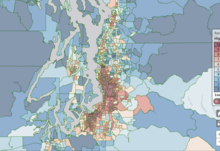0
Interactive
Community:
NHC’s annual release of Paycheck to Paycheck provides insights into the ability of working households to afford typical housing in metropolitan areas across the country. The published report highlights the housing affordability challenges of workers within the construction industry across 259 metropolitan areas. See our methodology for more information on how we come up with our numbers (or use the same methodology to do your own analysis).
Authored by: National Housing Conference
Topics: Homelessness, Housing, Legislation & Policy, Low-income
 Shared by Housing Is
Shared by Housing Is
Housing Is posted a
on May 1, 2019
National Housing Conference
NHC’s annual release of Paycheck to Paycheck provides insights into the ability of working households to afford typical housing in metropolitan areas across the country.
0
Interactive
Community:
Self-paced courses for home visitors and supervisors and webinars that cover: the basics of home visiting, foundations of infant mental health in home visiting, domestic violence in home visiting, substance abuse in home visiting, the impact of trauma on home visiting, building engaging and collaborative relationships with families, and home visiting with families during pregnancy.
Authored by: The Ounce
Topics: Child welfare, Early childhood, Health, Home visiting
 Shared by Housing Is
Shared by Housing Is
Housing Is posted a
on Apr 29, 2019
Self-paced courses for home visitors and supervisors and webinars that cover: the basics of home visiting, foundations of infant mental health in home visiting, domestic violence in home visiting, substance abuse in home visiting, the impact of trauma on home visiting, building engaging and collabor
0
Interactive
Community:
Displacement tracts are those showing strong economic expansion and a net decline in low-income population. Concentration tracts are those showing strong economic decline and a net increase in low-income population.
Authored by: Institute on Metropolitan Opportunity at the University of Minnesota Law School
Topics: Community development, Low-income, Research
 Shared by Mica O'Brien
Shared by Mica O'Brien
Mica O'Brien posted a
on Apr 18, 2019
Institute on Metropolitan Opportunity at the University of Minnesota Law School
Displacement tracts are those showing strong economic expansion and a net decline in low-income population. Concentration tracts are those showing strong economic decline and a net increase in low-income population.
0
Webinar
Community:
Apr 10, 2019
Advocacy is everyone's job and it is essential to the children and communities we serve. CLPHA’s Education Working Group hosted a webinar to learn about advocacy efforts to build support and investment in housing. Representatives from Partnership for Children and Youth (PCY) – a California-based advocacy organization that promotes and supports learning opportunities for underserved students – discussed strategies for providing, sustaining, and increasing access to Out-of-School-Time services in housing. PCY also touched on a range of advocacy strategies and preliminary results from the Save After School Campaign in California.
Authored by: CLPHA
Topics: CLPHA, Education, Housing, Housing Is Working Group, Legislation & Policy, Out-of-school time, Partnerships, Youth
 Shared by Housing Is
Shared by Housing Is
Housing Is posted a
on Apr 10, 2019
Advocacy is everyone's job and it is essential to the children and communities we serve. CLPHA’s Education Working Group hosted a webinar to learn about advocacy efforts to build support and investment in housing.
0
Interactive
Community:
The Legal Bibliography is collection of 100+ papers, toolkits and other materials focused on privacy, consent and policy documentation. Co-developed by the Network for Public Health Law and Data Across Sectors for Health (DASH), the Bibliography is a growing resource for lawyers and community data practitioners, intended to support local collaboratives in their efforts to share data across sectors.
Authored by: Data Across Sectors for Health (DASH) and Network for Public Health Law (NPHL)
Topics: Criminal justice, Data sharing, Education, Health, Homelessness, Housing, Mental health, Partnerships, Safety
 Shared by Housing Is
Shared by Housing Is
Housing Is posted a
on Apr 8, 2019
Data Across Sectors for Health (DASH) and Network for Public Health Law (NPHL)
The Legal Bibliography is collection of 100+ papers, toolkits and other materials focused on privacy, consent and policy documentation.
0
Interactive
Community:
We're creating the foundations of change. Together, we can provide more families with access to a safe place to live.
Authored by: Freddie Mac, Duty to Serve
Topics: Community development, Housing, Legislation & Policy
 Shared by Housing Is
Shared by Housing Is
Housing Is posted a
on Apr 8, 2019
Freddie Mac, Duty to Serve
We're creating the foundations of change. Together, we can provide more families with access to a safe place to live.
0
Interactive
Community:
Resources from Ascend at The Aspen Institute
Authored by: Ascend: The Aspen Institute
Topics: Asset building, Child welfare, Dual-generation, Early childhood, Family engagement, Research, Youth
 Shared by Mica O'Brien
Shared by Mica O'Brien
Mica O'Brien posted a
on Apr 2, 2019
Ascend: The Aspen Institute
Resources from Ascend at The Aspen Institute
0
Interactive
Community:
This interactive map provides state-by-state data on Supplemental Nutrition Assistance Program (SNAP) participation rates among eligible seniors and for comparison, participation rates among all eligible individuals. FRAC’s map and accompanying tables show that just 42 percent of eligible seniors (60+) are using SNAP on average each month — compared to 83 percent of all SNAP-eligible people that participate in SNAP.
Authored by: Food Research & Action Center (FRAC)
Topics: Food insecurity, Health, Nutrition, Seniors
 Shared by Housing Is
Shared by Housing Is
Housing Is posted a
on Apr 2, 2019
Food Research & Action Center (FRAC)
This interactive map provides state-by-state data on Supplemental Nutrition Assistance Program (SNAP) participation rates among eligible seniors and for comparison, participation rates among all eligible individuals.
0
Interactive
Community:
Mar 20, 2019
As the population ages, one of the greatest challenges facing state officials is how to organize and pay for long-term services and supports (LTSS) for low-income elderly and disabled adults—the most complex, expensive, and fastest-growing group covered by Medicaid. To help address this challenge, a toolkit for state leaders published in 2017 has been updated.
Authored by: Manatt Health Strategies and PhD Center for Health Care Strategies
Topics: Disabilities, Health, Low-income, Medicaid / Medicare, Partnerships, Seniors
 Shared by Housing Is
Shared by Housing Is
Housing Is posted a
on Mar 26, 2019
Manatt Health Strategies and PhD Center for Health Care Strategies
As the population ages, one of the greatest challenges facing state officials is how to organize and pay for long-term services and supports (LTSS) for low-income elderly and disabled adults—the most complex, expensive, and fastest-growing group covered by Medicaid.
0
Interactive
Community:
After working with 37 communities across the country over the last three years to drive sustainable improvements in community health we’ve we’ve seen how when specific approaches are implemented, namely Bold, Upstream, Integrated, Local, and Data-Driven approaches, meaningful change affecting the health of a community can happen. We’ve done our best to document the processes, the successes, and the failures along the way, and from those real-world experiences we’ve created a set of preliminary tools that can inform and guide those interested in learning about the unique BUILD approach.
Authored by: All In: Data for Community Health
Topics: Community development, Data sharing, Health, Partnerships
 Shared by Housing Is
Shared by Housing Is
Housing Is posted a
on Mar 19, 2019
All In: Data for Community Health
After working with 37 communities across the country over the last three years to drive sustainable improvements in community health we’ve we’ve seen how when specific approaches are implemented, namely Bold, Upstream, Integrated, Local, and Data-Driven approaches, meaningful change affecting the he
0
Interactive
Community:
The NQP Social Determinants of Health Data Integration Action Team brings together experts and recognized leaders from the private and public sectors committed to accelerating the integration of data on social determinants of health (SDOH) into clinical practice. Through a series of web meetings and one in-person forum, the NQP Social Determinants of Health Data Integration Action Team Action Team will develop and share successful approaches to integrating SDOH data to support providers and communities in their efforts to eliminate disparities.
Authored by: National Quality Forum
Topics: Data sharing, Health, Partnerships, Racial inequalities, Research
 Shared by Housing Is
Shared by Housing Is
Housing Is posted a
on Mar 18, 2019
The NQP Social Determinants of Health Data Integration Action Team brings together experts and recognized leaders from the private and public sectors committed to accelerating the integration of data on social determinants of health (SDOH) into clinical practice.
0
Interactive
Community:
On behalf of All In: Data for Community Health, Data Across Sectors for Health (DASH) is conducting The 2019 National Inventory of Data Sharing Collaborations for Health to better understand the location and nature of multi-sector collaborations in the United States, their capacity for data-sharing to improve health, and to assess progress in this field among multi-sector collaborations. Your participation in The National Inventory will also help us identify areas for further learning and opportunities to support and expand these activities. All In: Data for Community Health is a learning network of communities that are testing exciting new ways to systematically improve community health outcomes through multi-sector collaborations using shared data.
Authored by: All In: Data for Community Health
Topics: Data sharing, Health, Partnerships, Research
 Shared by Housing Is
Shared by Housing Is
Housing Is posted a
on Mar 13, 2019
All In: Data for Community Health
On behalf of All In: Data for Community Health, Data Across Sectors for Health (DASH) is conducting The 2019 National Inventory of Data Sharing Collaborations for Health to better understand the location and nature of multi-sector collaborations in the United States, their capacity for data-sharing
0
Webinar
Community:
Feb 28, 2019
Join us for an examination of how cross-sector data sharing initiatives are being used to tackle tough public health problems. The webinar will provide an in-depth look at a cross-sector collaboration in Illinois between public health, law enforcement, emergency medical services, a fire department and a jail aimed at addressing the needs of high utilizers of behavioral health services.
Authored by: The Network for Public Health Law
Topics: Criminal justice, Data sharing, Health, Mental health, Midwest, Partnerships, Safety, Stability
 Shared by Housing Is
Shared by Housing Is
Housing Is posted a
on Mar 6, 2019
The Network for Public Health Law
Join us for an examination of how cross-sector data sharing initiatives are being used to tackle tough public health problems.
0
Interactive
Community:
Includes: The Strength of SNAP and SNAP Action Needed, The Emergency Food Assistance Program (TEFAP), Commodity Supplemental Food Program (CSFP), and Child Nutrition Reauthorization.
Authored by: Food Research & Action Center (FRAC)
Topics: Food insecurity, Funding, Legislation & Policy, Low-income, Nutrition
 Shared by Mica O'Brien
Shared by Mica O'Brien
Mica O'Brien posted a
on Mar 1, 2019
Food Research & Action Center (FRAC)
Includes: The Strength of SNAP and SNAP Action Needed, The Emergency Food Assistance Program (TEFAP), Commodity Supplemental Food Program (CSFP), and Child Nutrition Reauthorization.
0
Interactive
Community:
Restoring the value of the minimum wage — and helping families cover basic needs — is essential to addressing hunger. The federal minimum wage of $7.25 an hour has not increased since 2009. A more adequate minimum wage would foster the nation’s economic strength and growth to be shared in more equitable ways. Low-income workers and their families would benefit the most from a higher minimum wage, leading to reduced poverty, hunger, and income inequality.
Authored by: Food Research & Action Center (FRAC), the Economic Policy Institute, and the National Employment Law Project
Topics: Asset building, Legislation & Policy, Low-income
 Shared by Mica O'Brien
Shared by Mica O'Brien
Mica O'Brien posted a
on Mar 1, 2019
Food Research & Action Center (FRAC), the Economic Policy Institute, and the National Employment Law Project
Restoring the value of the minimum wage — and helping families cover basic needs — is essential to addressing hunger. The federal minimum wage of $7.25 an hour has not increased since 2009.
0
Interactive
Community:
Federal tax credits, like the EITC and refundable CTC, provide critical supports for millions of working women, children, and families every year. They supplement low wages and can help soften the financial impact of fluctuating incomes or job losses. These credits are especially important for communities of color and women.
Authored by: Food Research & Action Center (FRAC)
Topics: Child welfare, Legislation & Policy, Low-income, Research
 Shared by Mica O'Brien
Shared by Mica O'Brien
Mica O'Brien posted a
on Mar 1, 2019
Food Research & Action Center (FRAC)
Federal tax credits, like the EITC and refundable CTC, provide critical supports for millions of working women, children, and families every year. They supplement low wages and can help soften the financial impact of fluctuating incomes or job losses.
0
Interactive
Community:
This decision-support tool enables you to exhibit economic conditions among communities in the Portland-Vancouver region and it provides a data picture of the regional economy to align investments that achieve the coordinated vision of Greater Portland 2020, the 2040 Growth Concept, the Regional Transportation Plan, and Metro’s six desired outcomes, focused on ensuring current and future residents benefit from the region’s sustained economic competitiveness and prosperity.
Authored by: Oregon Metro
Topics: Community development, Low-income, Racial inequalities
 Shared by Mica O'Brien
Shared by Mica O'Brien
Mica O'Brien posted a
on Feb 28, 2019
This decision-support tool enables you to exhibit economic conditions among communities in the Portland-Vancouver region and it provides a data picture of the regional economy to align investments that achieve the coordinated vision of Greater Portland 2020, the 2040 Growth Concept, the Regional Tra
0
Interactive
Community:
More tan 1.3 million homeless students K-12 have been identified in America's public schools.
Authored by: SchoolHouse Connection, Civic Enterprises, America's Promise Alliance, and Institute for Children, Poverty and Homelessness
Topics: Child welfare, Education, Homelessness, Housing, Legislation & Policy, Low-income, Youth
 Shared by Mica O'Brien
Shared by Mica O'Brien
Mica O'Brien posted a
on Feb 14, 2019
SchoolHouse Connection, Civic Enterprises, America's Promise Alliance, and Institute for Children, Poverty and Homelessness
More tan 1.3 million homeless students K-12 have been identified in America's public schools.
0
Webinar
Community:
Feb 12, 2019
During CLPHA’s Education Working Group Webinar on addressing school attendance at PHAs, representatives from the King County Housing Authority and the national nonprofit Attendance Works presented on tools for addressing chronic absenteeism, as well as strategies for fostering a culture of attendance among residents.
Authored by: CLPHA, Housing Is
Topics: Attendance, CLPHA, Dual-generation, Education, Housing, Housing Is Working Group, Low-income, Metrics, Partnerships, Place-based
 Shared by Housing Is
Shared by Housing Is
Housing Is posted a
on Feb 12, 2019
During CLPHA’s Education Working Group Webinar on addressing school attendance at PHAs, representatives from the King County Housing Authority and the national nonprofit Attendance Works presented on tools for addressing chronic absenteeism, as well as strategies for fostering a culture of attendanc
0
Webinar
Community:
Jul 17, 2018
Featuring Ellen Childs, PhD, from Boston University School of Public Health and Vaughan Rees, PhD, from Harvard T.H. Chan School of Public Health.
Authored by: Building Success
Topics: Health, Housing, Legislation & Policy, Smoke-free
 Shared by Housing Is
Shared by Housing Is
Housing Is posted a
on Feb 4, 2019
Featuring Ellen Childs, PhD, from Boston University School of Public Health and Vaughan Rees, PhD, from Harvard T.H. Chan School of Public Health.
0
Interactive
Community:
The map focuses on four critical areas of policy: protections against source-of-income discrimination, the regulation of short-term rentals, inclusionary housing programs, and rent control. The rising tide of state preemption detailed in this tool makes it clear that local initiatives and innovation are being blocked when the need for affordable housing and creativity in advancing inclusion is most needed.
Authored by: Poverty and Race Research Action Council
Topics: Housing, Legislation & Policy, Low-income, Racial inequalities, Research
 Shared by Mica O'Brien
Shared by Mica O'Brien
Mica O'Brien posted a
on Jan 31, 2019
Poverty and Race Research Action Council
The map focuses on four critical areas of policy: protections against source-of-income discrimination, the regulation of short-term rentals, inclusionary housing programs, and rent control.
0
Interactive
Community:
Jan 30, 2019
Medicaid helps low-income seniors, children, people with disabilities, and families get needed health care. Medicaid coverage improves families’ financial security by protecting them from medical debt and helping them stay healthy for work. Medicaid coverage also has long-term health, educational, and financial benefits for children. Click on the map to learn more about Medicaid’s contributions to your state.
Authored by: Matt Broaddus for the Center on Budget and Policy Priorities
Topics: Child welfare, Health, Legislation & Policy, Low-income, Medicaid / Medicare, Research
 Shared by Housing Is
Shared by Housing Is
Housing Is posted a
on Jan 30, 2019
Matt Broaddus for the Center on Budget and Policy Priorities
Medicaid helps low-income seniors, children, people with disabilities, and families get needed health care. Medicaid coverage improves families’ financial security by protecting them from medical debt and helping them stay healthy for work.
0
Interactive
Community:
Find Head Start Centers and Programs near you.
Authored by: Head Start: Early Childhood Learning & Knowledge Center (ECLKC)
Topics: Early childhood, Education, Family engagement, Low-income
 Shared by Mica O'Brien
Shared by Mica O'Brien
Mica O'Brien posted a
on Jan 29, 2019
Head Start: Early Childhood Learning & Knowledge Center (ECLKC)
Find Head Start Centers and Programs near you.
0
Interactive
Community:
Jan 11, 2019
A new mapping tool can help you learn more about the state of environmental health, wherever you live in Washington.
Authored by: Kamna Shastri for KUOW
Topics: Health, Housing, Pacific Northwest, Research
 Shared by Housing Is
Shared by Housing Is
Housing Is posted a
on Jan 17, 2019
A new mapping tool can help you learn more about the state of environmental health, wherever you live in Washington.
0
Interactive
Community:
Sep 20, 2018
This SchoolHouse Connection series is focused on helping youth experiencing homelessness succeed in college. We highlight best practices for supporting these students from institutions across the country. These are living documents that will be updated regularly to provide new and innovative practices.
Authored by: SchoolHouse Connection
Topics: Dual-generation, Education, Homelessness, Housing, Low-income, Post-secondary, Youth
 Shared by Mica O'Brien
Shared by Mica O'Brien
Mica O'Brien posted a
on Jan 16, 2019
This SchoolHouse Connection series is focused on helping youth experiencing homelessness succeed in college. We highlight best practices for supporting these students from institutions across the country.
 Shared by Housing Is
on May 1, 2019
Shared by Housing Is
on May 1, 2019
 Shared by Housing Is
on Apr 29, 2019
Shared by Housing Is
on Apr 29, 2019
 Shared by Housing Is
on Apr 10, 2019
Shared by Housing Is
on Apr 10, 2019
 Shared by Housing Is
on Apr 8, 2019
Shared by Housing Is
on Apr 8, 2019
 Shared by Housing Is
on Apr 8, 2019
Shared by Housing Is
on Apr 8, 2019
 Shared by Housing Is
on Apr 2, 2019
Shared by Housing Is
on Apr 2, 2019
 Shared by Housing Is
on Mar 26, 2019
Shared by Housing Is
on Mar 26, 2019
 Shared by Housing Is
on Mar 19, 2019
Shared by Housing Is
on Mar 19, 2019
 Shared by Housing Is
on Mar 18, 2019
Shared by Housing Is
on Mar 18, 2019
 Shared by Housing Is
on Mar 13, 2019
Shared by Housing Is
on Mar 13, 2019

 Shared by Housing Is
on Mar 6, 2019
Shared by Housing Is
on Mar 6, 2019

 Shared by Housing Is
on Feb 12, 2019
Shared by Housing Is
on Feb 12, 2019
 Shared by Housing Is
on Feb 4, 2019
Shared by Housing Is
on Feb 4, 2019
 Shared by Housing Is
on Jan 30, 2019
Shared by Housing Is
on Jan 30, 2019

 Shared by Housing Is
on Jan 17, 2019
Shared by Housing Is
on Jan 17, 2019






